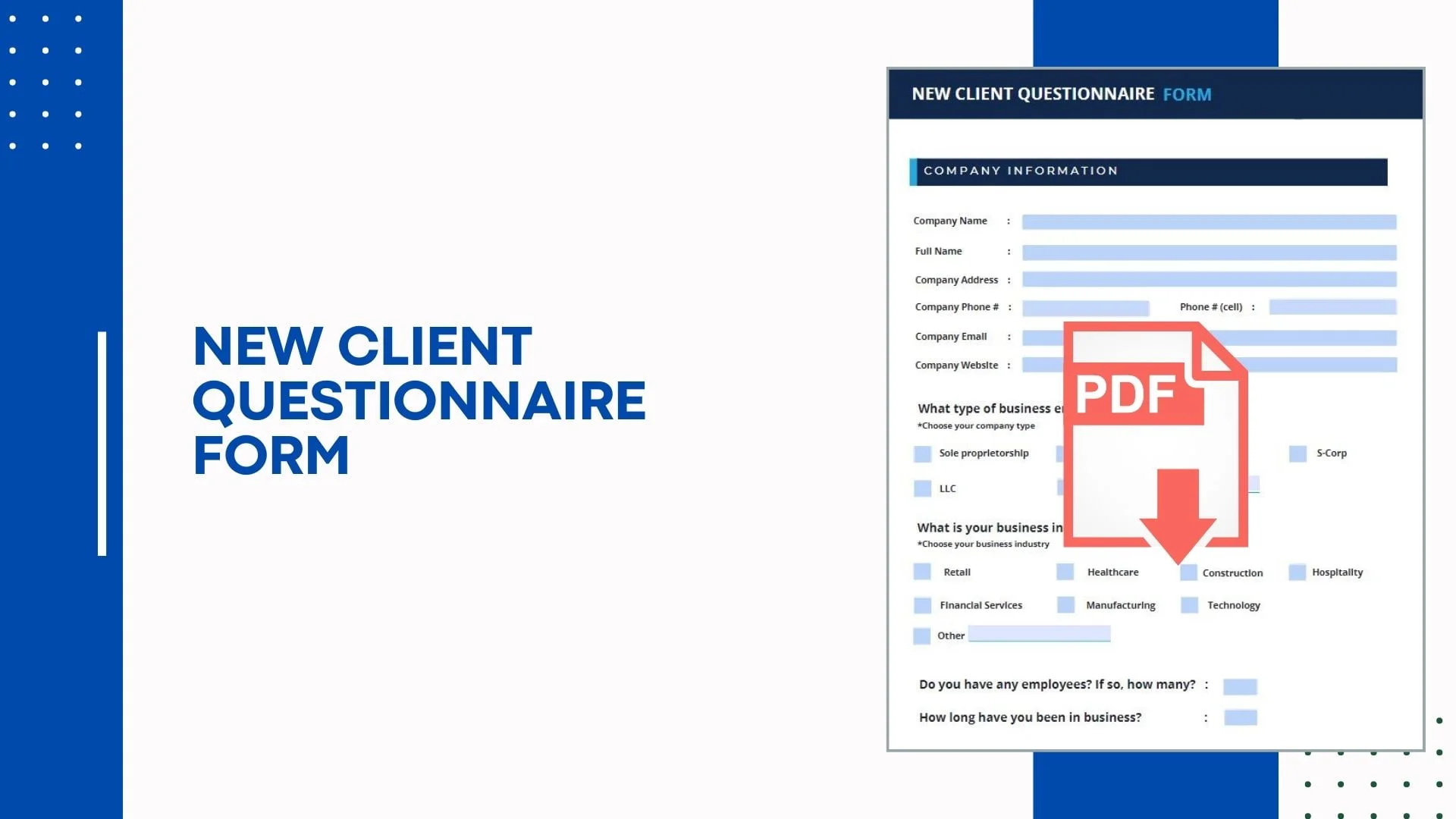Starting on the right foot with a new client in accounting is crucial. That’s where a new client questionnaire comes in handy.
It’s a simple tool that helps you understand exactly what each client needs right from the beginning.
This way, you can tailor your services perfectly to fit their specific requirements, ensuring they get the best from you.
In this blog, we’ll explore how creating a thorough questionnaire can make your interactions smoother and more productive.

When we start with new bookkeeping clients, we need a lot of information. This is so we can understand their business and goals. It helps us give them the bookkeeping services they need. That’s why a good onboarding process is key. It should include a new client questionnaire.
The new client questionnaire is a great way to get the info we need. It asks specific questions about the client’s business and what they want. With this information, we can set up their bookkeeping right. This makes sure we are accurate and efficient.
One big advantage of this questionnaire is building strong communication with the client. It lets us talk about important things. Things like which accounting software they prefer, and what reports they need.
This questionnaire is also a valuable tool for both of us. It gives bookkeepers a main point for all the client’s info. This lets us offer customized services. Clients can say what they expect. This makes sure the bookkeeper knows what to do to meet their needs.
There’s also something called onboarding super useful client checklists. They list all the steps we need to take with a new client.
With these checklists, bookkeepers make sure they don’t miss anything. They help gather all the needed information and set up everything right. They also help start good communication with the client. This method saves time and avoids mistakes. It helps kick off a great partnership with the client.
So, using a new client questionnaire and a checklist makes onboarding better. They ensure clear talks and the right accounting solutions. They lay a solid base for a strong and helpful relationship between the client and the bookkeeper.
Asking the right questions is crucial when welcoming a new bookkeeping client. A detailed questionnaire helps bookkeepers understand their client’s business, goals, and how they keep their books.
These key questions ensure bookkeepers can offer personalized and effective services:
Start by learning the basics of the client’s company. This includes the type of business, industry, how it’s set up, and employee count. Also, ask about the banks and credit cards the business uses.
Find out what accounting software the client uses or plans to use. Knowing this lets bookkeepers offer the right help, like software training.
It’s important to know the client’s financial aims both now and in the future. This info helps bookkeepers focus their efforts, whether it’s managing cash better, cutting costs, or boosting profits.
Learn about the client’s bookkeeping habits and what they expect. Ask how often they want reports, their favorite ways to chat, and how they keep their financial records in order.
It’s also key to understanding how the client protects their financial info. Find out how they stop fraud and make sure their numbers are right.
Asking about taxes is a must. Get details on their tax history, any past issues, and what they expect for tax planning and help.
Find out what kinds of reports the client needs. This includes regular financial updates, customized reports, or ones specific to their industry.
If the client works in a special field, ask questions related to that area. For instance, retail businesses might need help with tracking inventory or their sales systems.
Using these questions in a bookkeeping questionnaire makes sure bookkeepers fully grasp their client’s business and financial needs. This leads to custom solutions and top-notch service.
[wptb id=11223]In today’s fast-paced business world, efficiency and accuracy are key for accountants. That’s why the new accounting client questionnaire template is a game changer.
This comprehensive form can streamline the process of gathering essential information from new clients, ensuring that nothing slips through the cracks.
Gone are the days of deciphering messy handwriting or incomplete information. The new client questionnaire for accounting bookkeeping services provides a structured framework for accountants to collect all the necessary details.
From basic contact information to specific financial goals and needs, this form covers it all. Accountants can now spend less time chasing clients for missing information and focus more on providing high-quality services.
Additionally, the bookkeeping intake form allows accountants to have a clear understanding of a client’s financial situation from the very beginning.
This helps in identifying potential challenges or areas that need special attention. Armed with this knowledge, accountants can develop customized strategies and solutions that cater to each client’s unique needs and objectives.
Overall, utilizing the new questionnaire form provides accountants with a competitive advantage. It simplifies the onboarding process, enhances efficiency, and ensures accuracy.
By leveraging this powerful tool, accountants can deliver exceptional services, build strong client relationships, and ultimately achieve success in this ever-evolving industry.
A new accounting client questionnaire helps bookkeepers and clients talk better. It makes sure they understand each other from the start. This way, everyone knows what to expect and important details are shared.
The questionnaire helps bookkeepers know what clients need and want. By asking specific questions, they learn more about each client. Then, they can give personalized financial advice.
This questionnaire also makes collecting information easy and neat. Clients talk about their business and what they need from bookkeepers. This lets bookkeepers give better, tailored advice.
An accounting client information sheet is also useful. It tells clients what info to give, like their contact info and business type. It’s a simple way to make sure nothing is forgotten.
With this sheet, both sides make sure they have everything they need. It prevents mistakes and missing info. So, bookkeepers can help their clients with their money.
Using both a questionnaire and an information sheet improves talking and understanding. It helps bookkeepers get what clients need. This way, they can offer the right help and build a good working relationship.

As accounting changes, efficient, precise, and tailored ways to welcome new clients are becoming more crucial.
A key tool reshaping how accountants bring in new clients is the New Client Questionnaire Form.
Powered by various software, this tool offers big benefits. It helps collect data efficiently, improves how work flows, and strengthens how accountants manage their relationships with clients.
In summary, JotForm provides an easy-to-use platform that includes a straightforward form builder, simple sharing options, and various design templates. It also uses conditional logic to improve the client experience, helping gather more accurate and relevant information.
In summary, Typeform stands out for its user-centric approach, promoting higher response rates through engaging forms. Additionally, its compatibility with various tools and platforms contributes to efficient data management.
In summary, SurveyMonkey, recognized for its survey capabilities, extends its utility to client questionnaire forms with diverse question types, a template library, and advanced analytics—especially beneficial for accountants seeking deeper insights into collected data.
In conclusion, the New Client Questionnaire Form is a real game-changer in accounting, making the process of bringing in new clients much smoother.
These software tools help accountants efficiently collect and manage client information, improve their workflow, and enhance their relationships with clients.
By choosing the right questionnaire software, accounting firms of all sizes can take advantage of technological advances in the industry.
The future of accounting is digital and streamlined, thanks to innovative tools like the new client questionnaire.
A new client questionnaire is key for those in accounting and bookkeeping. It helps in making things smoother and ensures services fit the client’s needs. It also makes talking with clients better.
This questionnaire lets bookkeepers know critical info about a client’s goals and needs. It makes providing personalized accounting services possible. It also helps in organizing the onboarding process efficiently.
Using this questionnaire improves how financial service providers communicate. It helps both sides understand each other better. This leads to a better client experience and easier collaboration.
For smooth client onboarding and satisfaction, a new client questionnaire is essential. It helps in offering tailored services, making operations smoother, and enhancing communication.